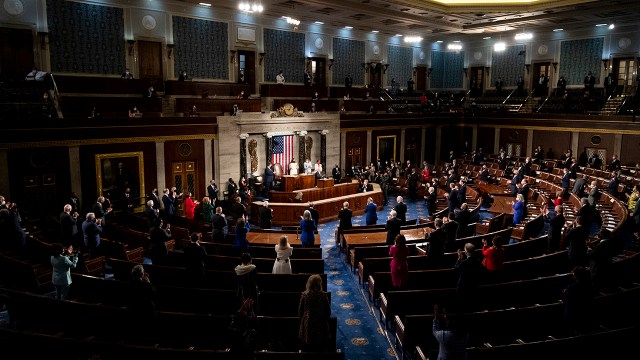

President Joe Biden will deliver his first State of the Union address on Tuesday night. The speech comes as the country approaches the third year of the coronavirus pandemic, and amid rising concerns about the economy and challenges from abroad.
Here’s a look at public opinion on some of the key issues facing the country, drawn from recent Pew Research Center surveys.
How we did thisThis analysis looks at Americans’ views on a variety of key national issues ahead of the annual State of the Union address.
Methodology for each Pew Research Center poll can be found at the links in the post. Everyone who took part in the surveys is a member of the Center’s American Trends Panel (ATP), an online survey panel that is recruited through national, random sampling of residential addresses. This way nearly all U.S. adults have a chance of selection. The survey is weighted to be representative of the U.S. adult population by gender, race, ethnicity, partisan affiliation, education and other categories. Read more about the ATP’s methodology.
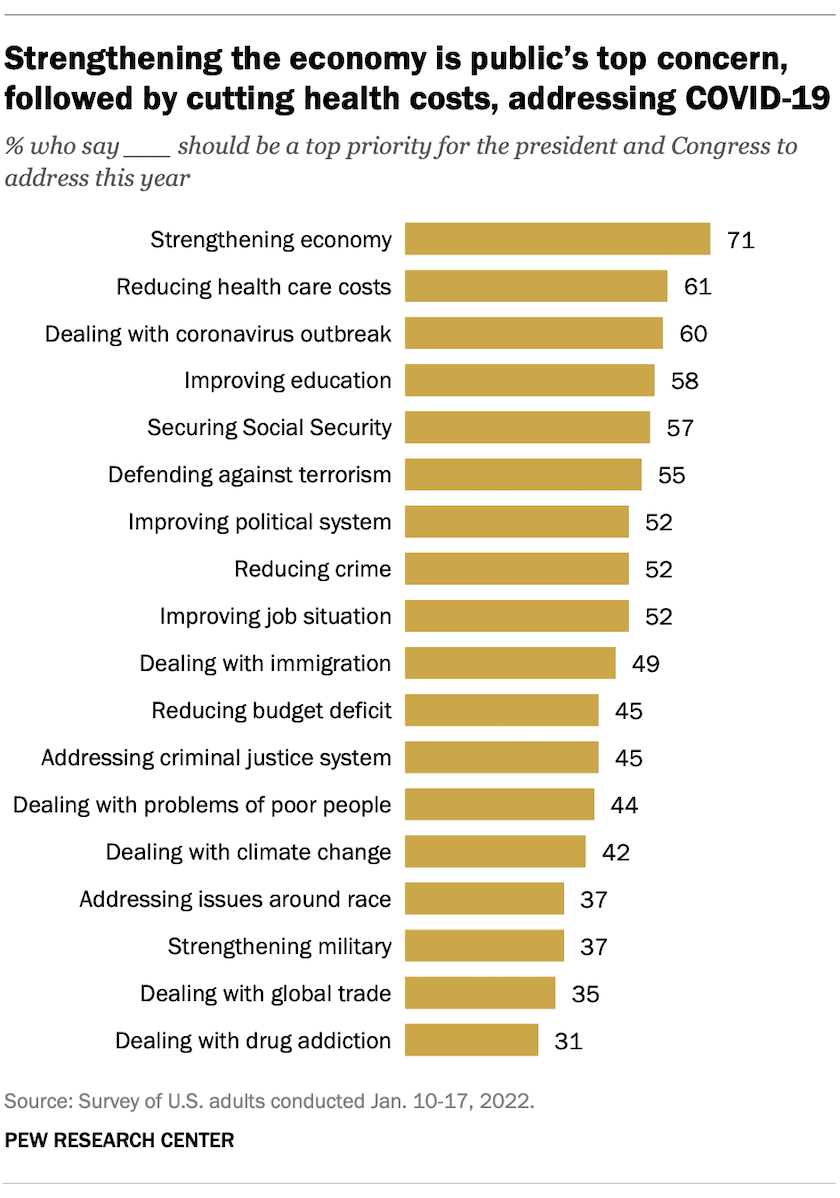
More Americans say strengthening the economy should be a top policy priority for Biden and Congress to address this year than say the same about any other issue. Most U.S. adults (71%) identify this as a top concern, according to a Center survey conducted in January that asked about the importance of 18 policy priorities.
The public’s concern about the economy comes at a time when inflation in the United States has hit a 40-year high. Large majorities of Americans say prices for food and consumer goods (89%), gas prices (82%) and the cost of housing (79%) are worse than they were a year ago. Only 28% rate economic conditions as excellent or good.
Still, the share of Americans who cite strengthening the economy as a top priority has dropped 9 percentage points from a year ago, and concern about jobs has declined. Only about half of Americans currently view improving the job situation as a top priority (52%), compared with 67% last year. Prior to the COVID-19 outbreak in 2020, there had been long-term drops in the shares citing the economy and jobs as top policy priorities.
The share of Democrats and independents who lean toward the Democratic Party who say strengthening the economy should be a top priority has fallen from 75% a year ago to 63% today. There has been almost no change in views among Republicans and GOP leaners: 85% said it was a top priority last year, and 82% view it that way today.
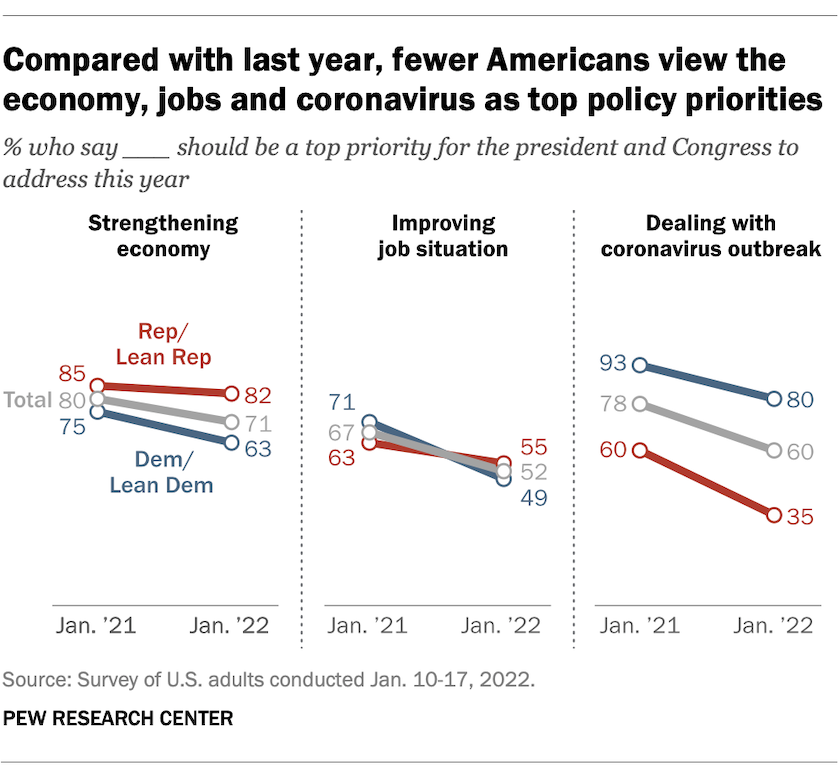
Dealing with the coronavirus outbreak ranked among Americans’ top three policy concerns in the January survey, but Americans view it as less important than they did last year. Six-in-ten now say it should be a major priority, down from 78% who said this in 2021.
The share who say dealing with the pandemic should be a top policy priority has fallen among members of both political parties, but the decline is steeper among Republicans: 60% said the pandemic was a top priority a year ago, compared with 35% today. Among Democrats, 93% viewed it as a major priority last year, compared with 80% now.
Younger people are also less likely to identify this as important than older Americans. Roughly half of adults under 50 (54%) say dealing with the coronavirus should be a top priority, compared with 61% of adults ages 50 to 64, and 72% of those ages 65 and older.
Nearly two-thirds of women (65%) say that this should be a top priority for the president and Congress this year. A smaller share of men (54%) say the same.
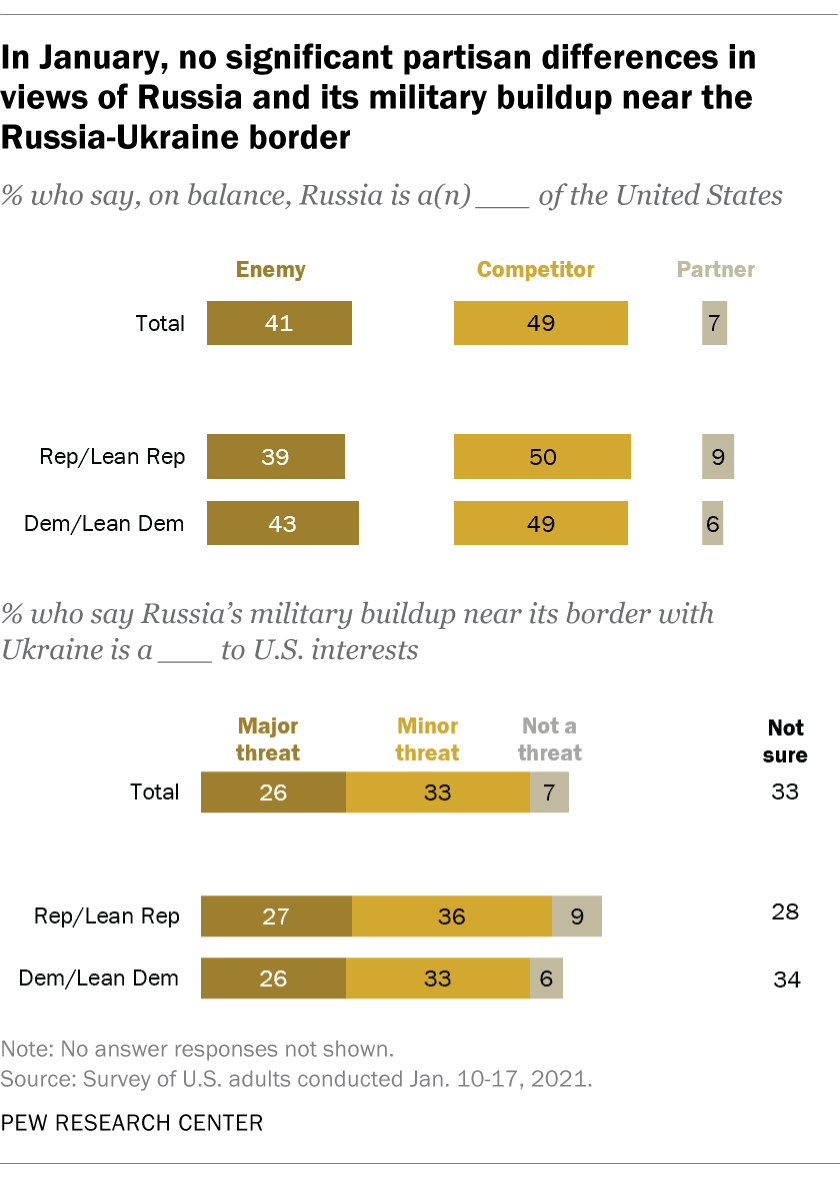
When it comes to rising U.S.-Russia tensions, an early January survey found that 26% of Americans considered the Russian military buildup near Ukraine to be a major threat to U.S. interests, while 33% said it was a minor threat to U.S. interests. Another 7% said it was no threat at all. A relatively large share of U.S. adults (33%) said they were not sure how Russian actions toward Ukraine affected U.S. interests. The survey was conducted prior to Russia’s invasion of Ukraine, before the U.S. put troops on higher alert, and before NATO announced that member countries would send military support to the region.
The survey found that about half of U.S. adults (49%) considered Russia a competitor of the U.S., while 41% said it is an enemy. Only 7% considered Russia a partner of the U.S.
When it comes to other foreign policy concerns, the share of Americans who rank defending the country against future terrorist attacks as a top policy priority has been steadily declining in recent years: 55% of Americans said in the January policy priorities survey that this should be a major priority, dropping from 63% last year and 74% in an early 2020 survey.
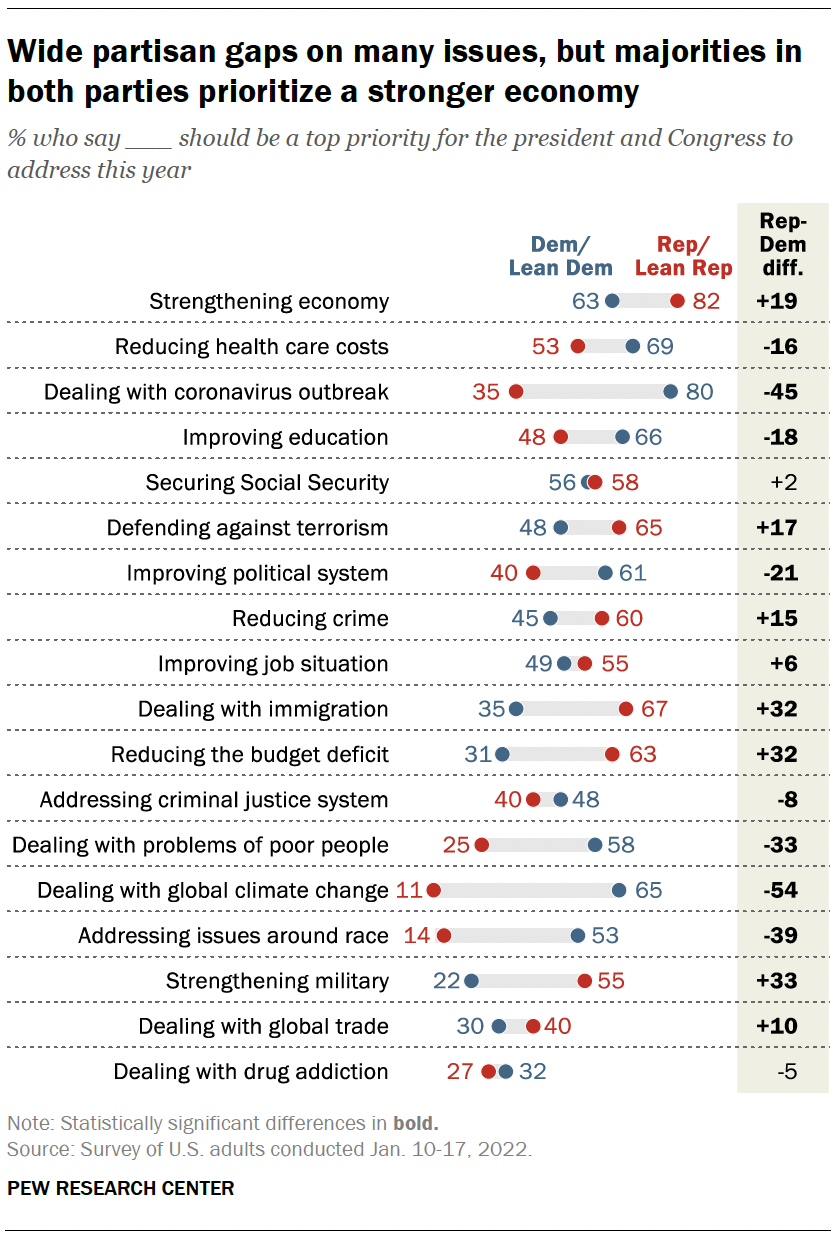
Dealing with global climate change was among the most politically divisive issues on the January survey: Roughly two-thirds of Democrats (65%) say this should be a top priority for Biden and Congress this year, compared with just 11% of Republicans.
Views also differ based on age. Adults under 30 are the only age group in which a majority (54%) say global climate change should be a top priority. This compares with 42% of those ages 30 to 49, 36% of those ages 50 to 64 and 39% of those age 65 and older.
In a survey conducted in April 2021, majorities of Americans said the federal government was doing too little to reduce the effects of global climate change (59%) and to protect important aspects of the environment including air quality (59%), water quality of lakes, rivers and streams (63%) and animals and their habitats (57%).
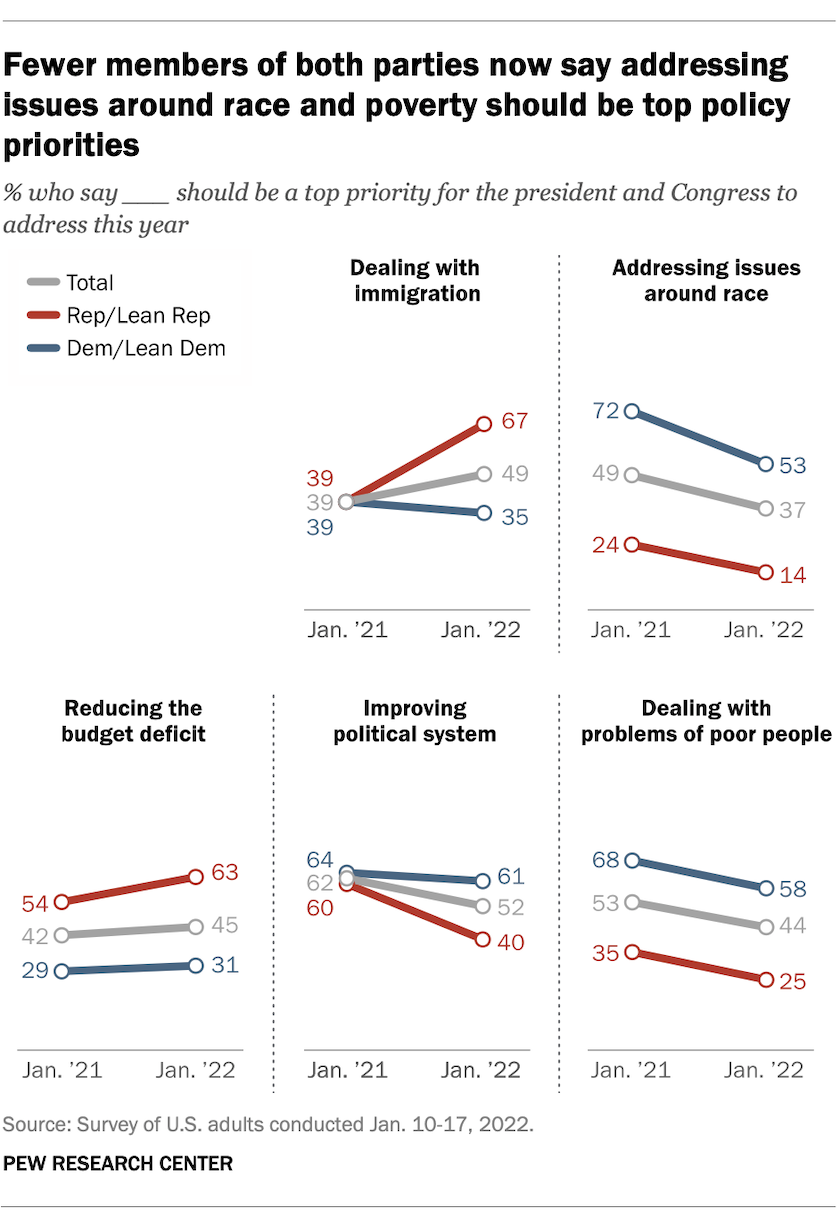
This year, 67% of Republicans view immigration as a top priority, compared with just 35% of Democrats. Overall, about half of Americans (49%) say that dealing with immigration should be a major priority for the president and Congress this year, up 10 points from a year ago. At that time, identical shares of Republicans and Democrats (39% each) said dealing with the issue of immigration should be a top priority.
Although the Biden administration has acted on a number of fronts to reverse more restrictive Trump-era immigration policies, deportation remains an important concern for many U.S. Latinos. A March 2021 survey of Latino adults found that nearly four-in-ten Latinos (39%) said they worry that they, a family member, or someone close to them could be deported. That concern was even higher among immigrants.
A spring 2021 survey found that 84% of Hispanic adults said there should be a way for undocumented immigrants to stay in the country legally if certain requirements were met, compared with 69% of U.S. adults overall.
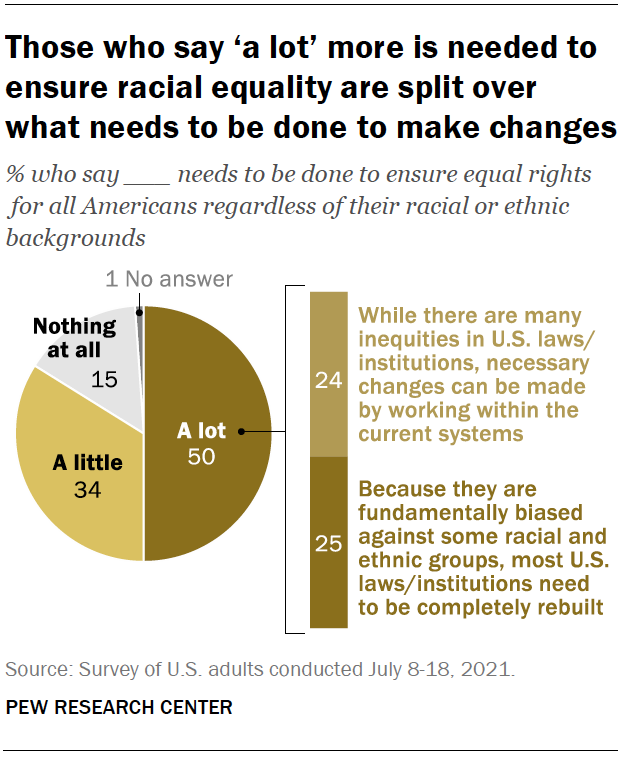
The share of Americans who say that addressing issues around race is an important priority this year has fallen from 49% in early 2021 to 37% this year. Black adults (66%) are more likely than either White (27%) or Hispanic adults (47%) to say this should be a top priority. There is also a partisan divide: 53% of Democrats say this should be a top priority, compared with 14% of Republicans.
Half of all adults said in a July 2021 survey that “a lot” more needs to be done to ensure equal rights for all Americans regardless of their race or ethnicity. About as many said either that a little (34%) or nothing at all (15%) needs to be done. Around a quarter of adults (24%) said that while there are many inequities in U.S. laws and institutions, necessary changes can be made by working within the current systems, while roughly as many (25%) said that most laws and major institutions need to be completely rebuilt because they are fundamentally biased against some racial and ethnic groups.
About six-in-ten Americans (61%) say that reducing health care costs should be a top policy priority for the president and Congress this year, according to the January survey. This is a leading priority for Democrats, 69% of whom view it as a top priority; only dealing with the coronavirus ranks higher (80%). Fewer Republicans (53%) identify lowering health care costs as a top priority.
In a separate January 2022 survey, 55% of Americans said the cost of health care is worse now than it was a year ago, and a larger share of Americans said they agreed with the Democratic Party’s health care policies than with the Republican Party’s (42% vs. 26%).
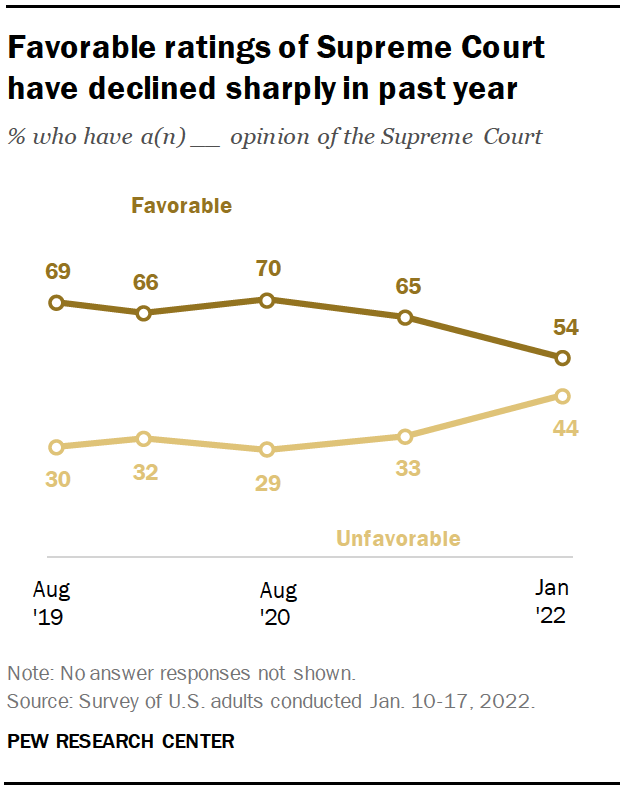
The public’s views of the court are as negative as they have been in many years. Democrats have expressed increasingly unfavorable opinions, according to a survey conducted in early January, before Justice Stephen Breyer announced his retirement and Biden reiterated his pledge to nominate the first Black woman to the Supreme Court. The survey also found that the overall public sees the court as more ideologically conservative than two years ago, and that view is particularly true of Democrats.
A slim majority of U.S. adults (54%) said in January that they have a favorable opinion of the Supreme Court while 44% have an unfavorable view. Over the past three years, the share of adults with a favorable view of the court has declined 15 points, driven largely by a drop-off among Democrats. Last year, 65% of Democrats said they had a favorable view of the court. Today, that number has fallen to 46%. Among liberal Democrats, just 36% view the court positively, down from 57%. Around two-thirds of Republicans (65%) hold a positive view of the court, largely unchanged since last year.
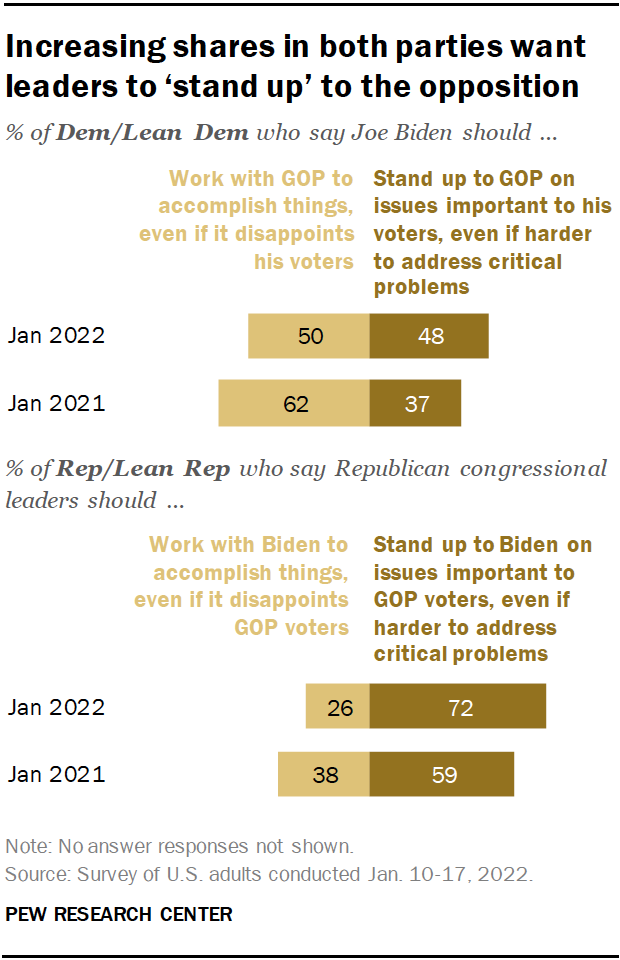
Congress continues to face gridlock on a variety of issues, and members of both political parties are less willing than they were a year ago to support concessions from their parties’ leaders to achieve results, a January survey found. Nearly half of Democrats (48%) want Biden to “stand up” to Republicans on issues important to his voters, even if it makes it harder to address key problems – an increase from the 37% who said this last year, shortly before his inauguration. About three-quarters of Republicans (72%) want GOP leaders to stand up to Biden, up 13 points from last year.
Partisanship is also evident when it comes to the work of a select committee in the Democratic-controlled House to investigate the Jan. 6, 2021, attack on the U.S. Capitol. In the January 2022 survey, 45% of Americans overall said they are at least somewhat confident that the committee’s investigation is fair and reasonable while 54% said they are not too or not at all confident that this is the case. Among Republicans, 79% said they have little or no confidence in the fairness of the Jan. 6 committee’s investigation, including 46% who have no confidence at all. By contrast, 65% of Democrats said they are at least somewhat confident that the investigation is fair and reasonable, and 27% said they are very confident.